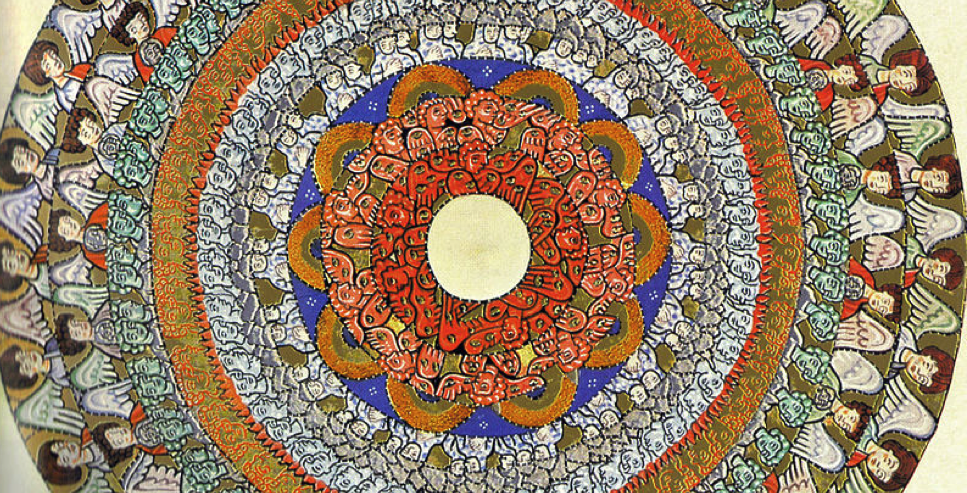
“As sickness is the greatest misery, so the greatest misery of sickness is solitude.” (John Donne, Devotions upon Emergent Occasions, V. Meditation.)
Last night as it was growing dark – after too many Zoom events in a long day (even, that day, a Zoom birthday party) – I went for a walk. It was a lovely evening, soft and quiet, warm light falling on the sidewalk from people’s living rooms, a bird singing. It was pleasant.
And it was eerie. There was no one there. Eight p.m. on the Danforth, and two people passed me, on the other side. No chatter from the restaurant patios. No restaurant patios; closed, of course. No post-work exercisers. Not even the dog-walkers were out (heeding, perhaps, the Italian mayors).
Was it just two weeks ago that the city thronged with life?
“Variable and therefore miserable condition of man! This minute I was well, and am ill this minute. I am surprised with a sudden change.” (Donne, Devotions, I. Meditation)
Yesterday in the church year we commemorated John Donne, priest and doctor of the church. When he was 51, in 1623, he got seriously ill, and from his sickbed he spoke with uncanny precision to this time.
“We study health, and we deliberate upon our meats and drink and air and exercises, and we hew and we polish every stone that goes to that building, and so our health is a long and regular work.” (I thought of the exercisers). “But in a minute a cannon batters all…a sickness unprevented for all our diligence.”
This thronging life, the whole busy city, is fragile. Though we can build towers that scrape the sky, “a fever can fillip [us] down.”
Donne rages against it: “O miserable condition of man!” That we who are “a little world,” whose thoughts are giants “that reach from east to west, from earth to heaven, that…span the sun” – “inexplicable mystery! I their creator am in a close prison, in a sick-bed.” (Devotions IV. Meditation). How easily we can be overthrown, by a virus we can’t even see. Donne rages against it, and the solitude it brings.
I thought of him as I walked the streets last night, and I thought of us, of all the people in so many places shut up in their homes – working and eating and sleeping and working out and Zooming and playing (as my son said) all in the same 400 sq. feet day after day. I thought of those who are ill. I thought of those in hospital. I thought of those who have died.
And this morning I picked up Donne again and came to the words with which he ends.
As he lies in his bed, alone, he hears the church bell tolling. For whom? He does not know. It does not matter, he says. Because in that church bell every one of us is included.
The church is catholic, universal, so are all her actions; all that she does belongs to all (XVII. Meditation).
When the church baptizes a child, it concerns me, because in the water of baptism that child “is connected to that body which is my head too.” That child becomes part of me, now, ingrafted into my life.
“And when she buries a man,” Donne goes on, “that action concerns me,” too.
In this church God has given us, we are not alone, even when we are by ourselves. By the God who made us, we are not alone.
All humankind is of one author, and is one volume.
Though I sit alone today in my own house, yet my heart is with you; yet my prayer is for my neighbour; yet I lift up my voice to my God for you, for the sick, for the children, for the elderly
We are all chapters in a single book, Donne says. There is no story in the Providence of God that does not encompass all of us together.
Even sickness, even death, cannot part us now.
When one person dies, one chapter is not torn out of the book, but translated into a better language
– over and over again, until all the chapters of all our lives become a single song, the song of the saints before the throne of God, all of us together singing “Glory.”
Even in that final solitude, death itself, we are not left alone. God’s hand is in every translation, Donne says, “and his hand shall bind up our scattered leaves again for that library where every book shall lie open to one another.”
Alone on his sickbed Donne envisions a great communion.
In God who makes us, in Christ who saves us, in the Holy Spirit and his church that joins us in love, no man is an island entire of itself. We are made to be one book, one story, one chorus of prayer and praise. There is no page that is not precious – if a clod be washed away by the sea, Europe is the less, as well as if a promontory were…Any man’s death diminishes me, because I am involved in mankind.
Those are powerful words, this week.
It may be that this time of solitude has a gift in it. It may be that it can remind us – unexpectedly – of the communion for which we are made, of God’s great book and the preciousness of every one of its pages, and of the day when his hand shall bind us all up for that library where we shall know fully, even as we are fully known.
